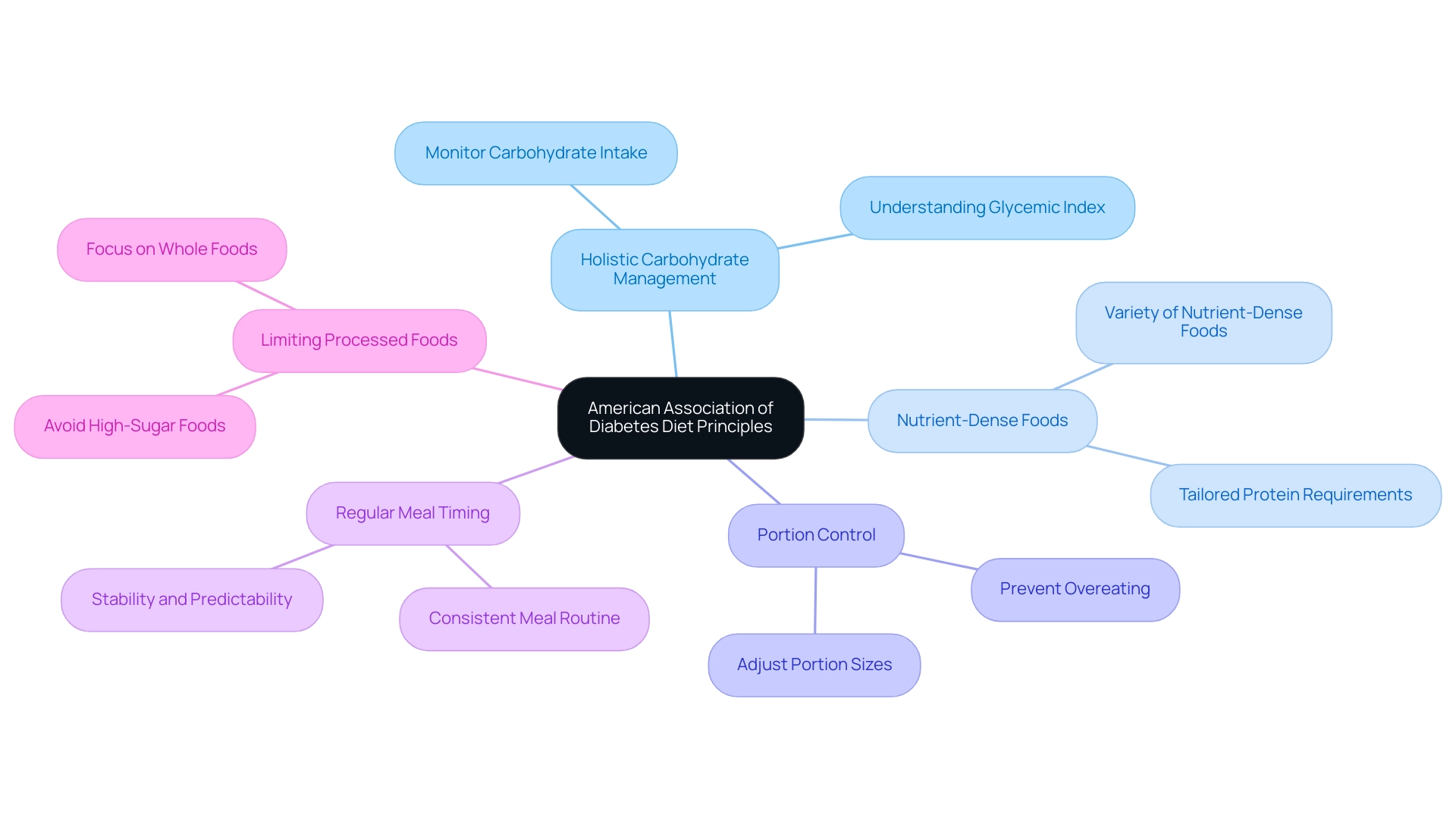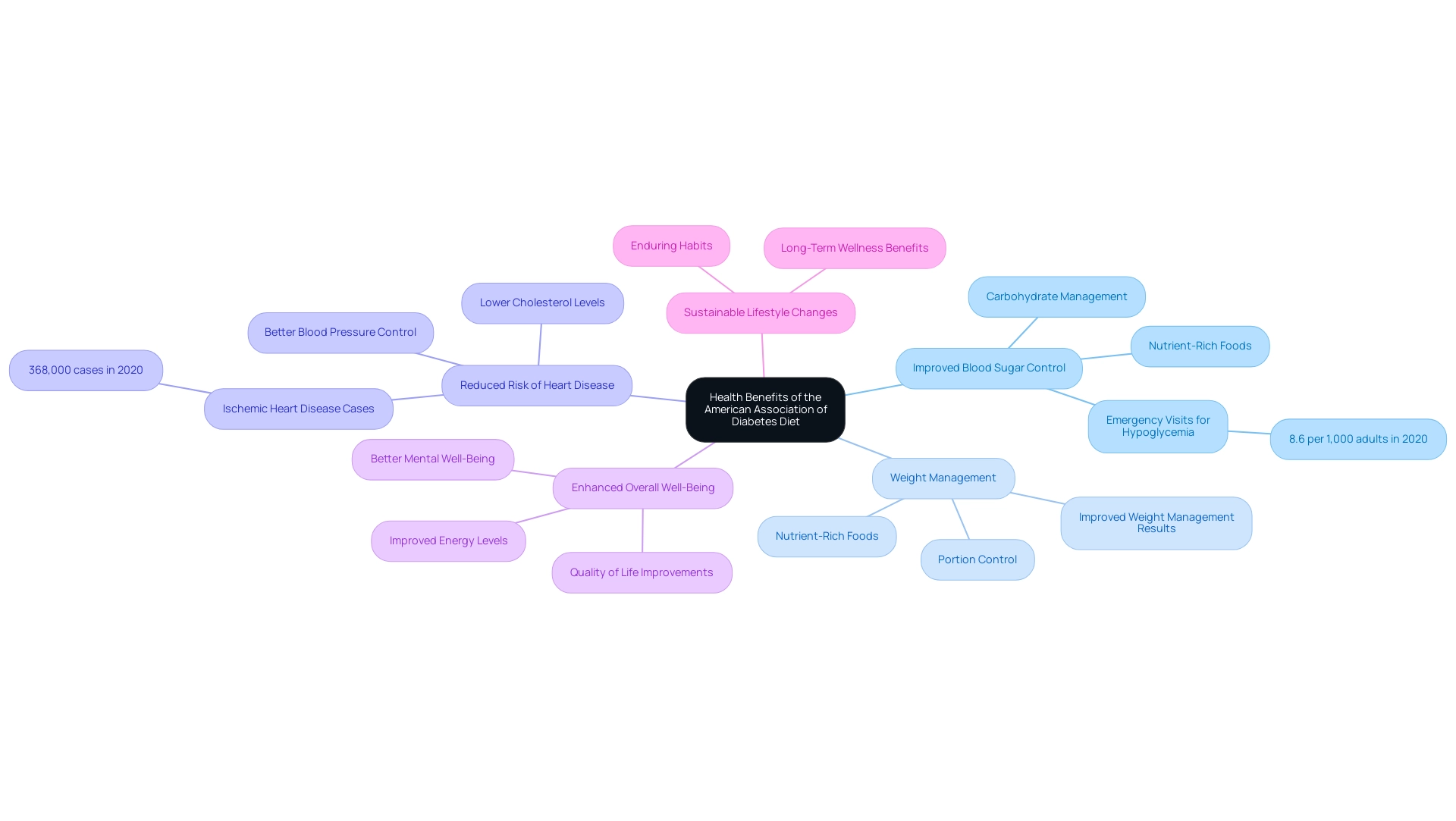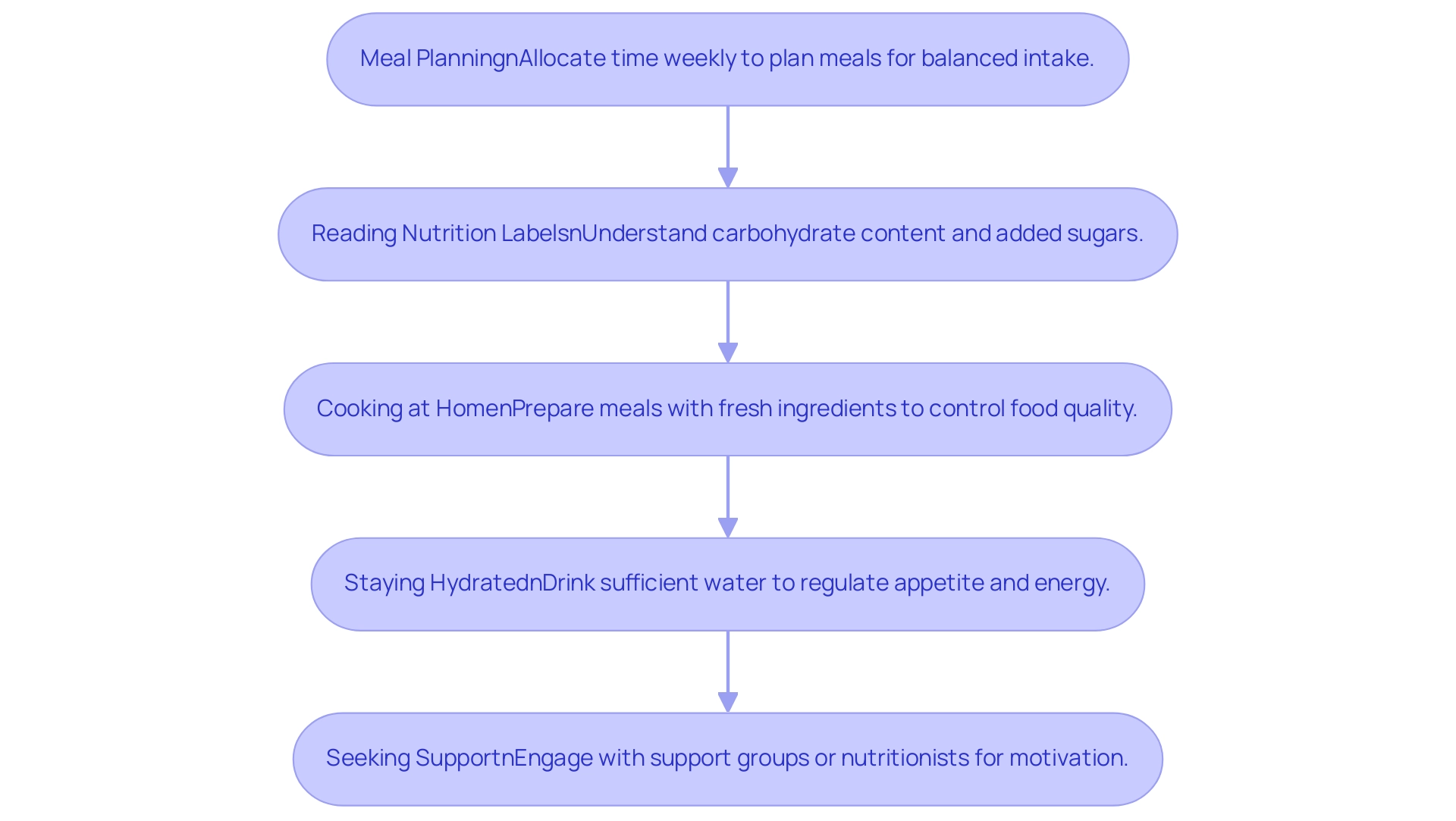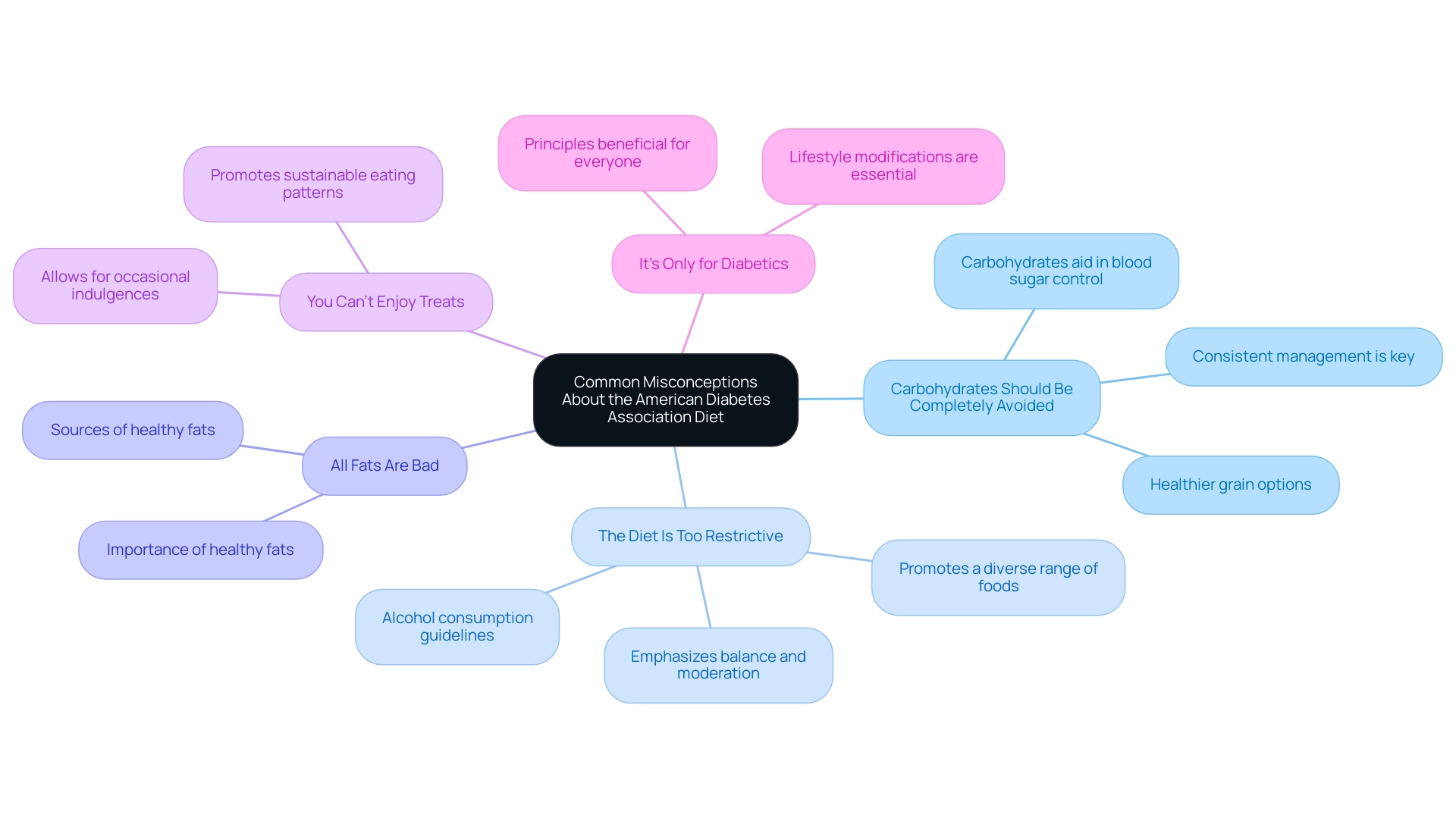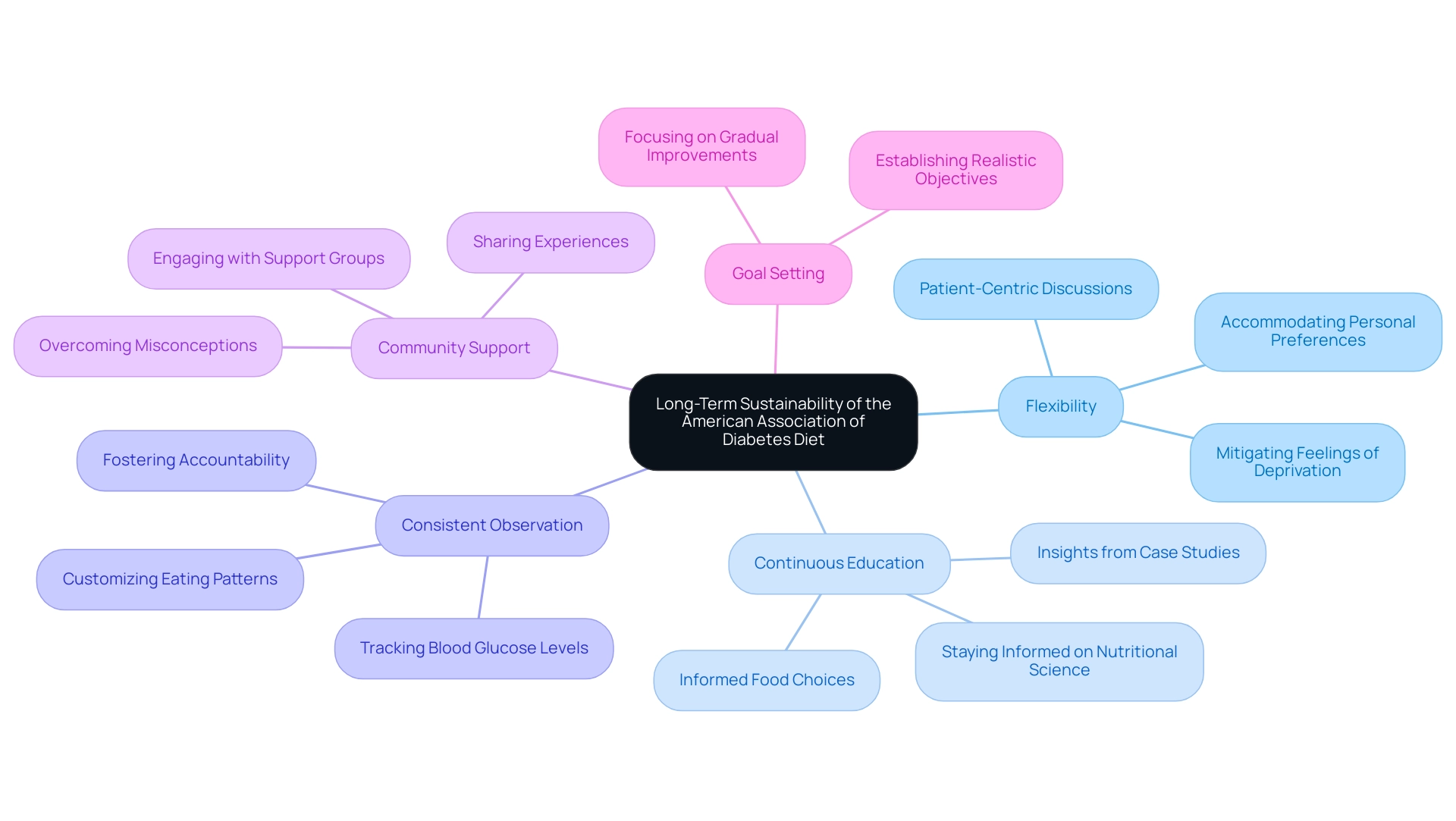Introduction
The American Association of Diabetes Diet offers a comprehensive framework designed to empower individuals in managing diabetes through informed nutritional choices. By emphasizing balanced nutrition, this diet addresses key components such as:
- Carbohydrate management
- Nutrient density
- Portion control
all while promoting a sustainable approach to eating. As the prevalence of diabetes continues to rise, understanding the principles behind this diet becomes increasingly crucial for effective management and improved health outcomes. This article delves into the core tenets of the American Diabetes Association Diet, its health benefits, practical implementation tips, common misconceptions, and strategies for long-term adherence, providing a roadmap for those seeking to enhance their well-being while navigating the complexities of diabetes management.
Overview of the American Association of Diabetes Diet Principles
The American Association of Diabetes Diet was established to promote balanced nutrition tailored for individuals with blood sugar management needs. Its foundational principles encompass several key components:
- Holistic Carbohydrate Management: This principle underscores the necessity of monitoring carbohydrate intake to maintain stable blood glucose levels. Understanding the glycemic index is crucial, as it informs choices that prioritize whole grains over refined carbohydrates. Recent studies have shown that proper carbohydrate management can improve glycemic control and lower HbA1c levels significantly, supporting the idea that addressing root causes is vital for reversing the condition.
- Nutrient-Dense Foods: The diet encourages the consumption of a variety of nutrient-dense foods, including fruits, vegetables, lean proteins, and healthy fats. Notably, the protein requirement for individuals with diabetes may be greater than the Recommended Dietary Allowance, emphasizing the importance of tailoring dietary choices to individual needs. Including vegetable-rich meals further aids blood sugar regulation and overall well-being, aligning with integrative approaches to wellness.
- Portion Control: Effective portion control is emphasized to prevent overeating, which is vital for managing weight and overall health. Adjusting portion sizes can assist people in meeting their dietary goals more effectively.
- Regular Meal Timing: Consistent meal timing is advocated to help regulate blood sugar levels. Creating a routine can offer stability and predictability, which is especially advantageous for people managing this condition.
- Limiting Processed Foods: The diet advises against the consumption of high-sugar and high-fat processed foods, which can lead to dangerous spikes in blood glucose levels. By concentrating on whole, unprocessed foods, individuals can better control their condition.
These principles not only align with current nutrition guidelines but also reflect the evolving understanding of effective nutritional interventions in managing blood sugar levels, as recommended by the American Association of Diabetes Diet. For instance, the case study titled “Nutritional Interventions in Type 2 Diabetes Management” highlights how changes in nutrition can improve glycemic control and lower HbA1c levels, emphasizing the importance of ongoing education and tailored nutrition interventions. As noted by Federico Ravaioli, a prominent expert in the field, “Nutrition in Patients with Type 2 Diabetes: Present Knowledge and Remaining Challenges.”
Moreover, addressing the anxiety surrounding the potential complications of this condition is crucial, as it can significantly impact one’s motivation to adhere to dietary guidelines. By incorporating lesser-known strategies, such as stress management techniques and mindful eating practices, people can enhance their overall wellness and well-being. By following these guidelines, individuals can promote a healthier lifestyle while effectively managing their condition, challenging myths and empowering them to take control of their well-being.
Health Benefits of Adopting the American Association of Diabetes Diet
Embracing the American Association of Diabetes Diet provides numerous significant health advantages, particularly when viewed through a holistic perspective that addresses the underlying factors of the condition. This approach not only aims to manage the condition effectively but also to alleviate the anxiety associated with the potential complications of the disease. Here are some key benefits of this diet:
- Improved Blood Sugar Control: Prioritizing carbohydrate management and nutrient-rich foods allows people to attain better glycemic control, a cornerstone of effective management of blood sugar levels. Studies show that nutritional modifications can result in substantial enhancements in blood sugar levels, which is crucial for lowering the risk of complications related to blood sugar issues. In fact, the crude rate of emergency department visits for hypoglycemia was 8.6 per 1,000 adults in 2020, highlighting the importance of effective blood sugar management.
- Weight Management: The diet emphasizes portion control and the consumption of nutrient-rich foods, which are critical for maintaining a healthy weight. This aspect is pivotal, as weight management can significantly lower the risk of diabetes-related complications. Research has indicated that people following this nutritional method often achieve improved weight management results.
- Reduced Risk of Heart Disease: Adhering to this nutritional framework can result in lower cholesterol levels and better blood pressure control, effectively reducing the chances of cardiovascular problems that often impact individuals with high blood sugar. The importance of cardiovascular wellness is highlighted by a report revealing that over 368,000 instances of ischemic heart disease were documented among individuals with blood sugar issues in 2020, stressing the necessity for effective nutritional strategies.
- Enhanced Overall Well-Being: A balanced diet not only supports physical wellness but also contributes to improved energy levels, better mental well-being, and an enhanced quality of life. Following nutritional guidelines can promote a feeling of well-being and stability in everyday life, which is essential for handling anxiety associated with complications from blood sugar issues.
- Sustainable Lifestyle Changes: The principles of this diet promote the adoption of enduring habits that provide long-term wellness benefits. By encouraging sustainable nutritional changes, individuals are more likely to sustain their wellness improvements over time, which is crucial for ongoing management of blood sugar levels.
In summary, the American Association of Diabetes Diet not only promotes effective management of diabetes but also enhances overall well-being by addressing the underlying causes. As Dr. Robert H. Shmerling emphasizes, “Studying the impact of dietary (or any other) recommendations is an important way to validate the guidelines’ usefulness.” This highlights the diet’s importance in encouraging healthier lifestyles and enhanced well-being for those controlling their blood sugar.
Practical Tips for Implementing the American Association of Diabetes Diet
Implementing the American Diabetes Association diet can be streamlined through several practical strategies that enhance management of the condition:
- Meal Planning: Allocate dedicated time each week to meticulously plan your meals, ensuring a balanced intake of carbohydrates, proteins, and fats. This proactive approach not only facilitates healthier choices but also mitigates the temptation to resort to processed foods, which often contain unhealthy ingredients. Notably, effective meal planning is crucial given that an estimated 97.6 million U.S. adults aged 18 years or older had prediabetes in 2021, highlighting the need for effective dietary strategies to combat this public health challenge.
- Reading Nutrition Labels: Mastering the skill of reading nutrition labels is vital for making informed food choices. Focus on understanding carbohydrate content and identifying added sugars, which can significantly impact blood glucose levels. Learning to estimate food intake through calorie counting is a vital skill that can empower individuals in managing their condition effectively.
- Cooking at Home: Preparing meals at home with fresh ingredients provides greater control over your food, allowing you to avoid hidden sugars and unhealthy fats commonly found in restaurant meals and pre-packaged foods. Home cooking encourages healthier eating practices and aids in improved blood sugar control, which is essential considering the high prevalence of prediabetes and its implications for strategies to prevent the condition.
- Staying Hydrated: Ensuring adequate hydration is essential for overall well-being and can assist in appetite regulation. Drinking sufficient water throughout the day can help prevent unnecessary snacking and contribute to maintaining optimal energy levels.
- Seeking Support: Engaging with a health support group or collaborating with a nutritionist can enhance motivation and accountability in your dietary journey. Expert advice and shared experiences can provide invaluable insights and encouragement.
These practical strategies can significantly elevate the chances of successfully adhering to the American Diabetes Association diet, ultimately leading to better outcomes. As emphasized in research published in the British Journal of Nutrition, effective meal planning can enable individuals to better control their condition and lessen their risk of developing more serious health complications. As noted by Federico Ravioli, > Nutrition in Patients with Type 2 Diabetes: Present Knowledge and Remaining Challenges, the importance of informed dietary choices cannot be overstated.
Common Misconceptions About the American Association of Diabetes Diet
Numerous misconceptions exist regarding the American Diabetes Association Diet, which can lead to misunderstandings and ineffective management of the condition:
- Myth: Carbohydrates Should Be Completely Avoided: It is essential to recognize that while managing carbohydrate intake is important, entirely eliminating carbohydrates can be harmful. Healthier grain options, such as quinoa, brown rice, and whole wheat bread, can be integrated into meals. These whole grains not only aid in blood sugar control but also provide lasting energy. According to a case study titled ‘Carbohydrates and Diabetes,’ carbohydrates are essential for nutrition and can be included in the diets of people with diabetes. Proper planning is necessary to manage blood sugar levels, and people should focus on selecting healthy carbohydrates and monitoring portion sizes to maintain balanced nutrition. Consistently managing carbohydrate intake is key to blood sugar control. Additionally, San Marcos restaurants are increasingly incorporating these healthier grains into their menus, providing practical options for those looking to enhance their meals.
- Myth: The Diet Is Too Restrictive: A common belief is that this diet severely restricts food choices. In contrast, the diet promotes a diverse range of foods, emphasizing balance and moderation rather than deprivation. This method enables people to savor a range of nutritious choices, including vegetable-rich meals that aid in blood sugar regulation and overall well-being. Furthermore, the flexibility of the diet extends to alcohol consumption; people with diabetes can drink alcohol but should stay within the recommendation of no more than 14 units a week, emphasizing moderation in all dietary aspects.
- Myth: All Fats Are Bad: This diet recognizes the significance of healthy fats, such as those found in avocados, nuts, and olive oil. These fats not only offer essential nutrients but also promote cardiovascular well-being, which is especially vital for people with diabetes.
- Myth: You Can’t Enjoy Treats: Many people fear that the diet prohibits treats entirely. However, it allows for occasional indulgences, provided they are balanced with healthier food choices. This flexibility promotes a sustainable and enjoyable eating pattern.
- Myth: It’s Only for Diabetics: While the diet is specifically designed for people with high blood sugar, many of its principles are beneficial for anyone looking to enhance their overall health and lower the risk of developing this condition. As highlighted in recent insights, using insulin to achieve blood glucose levels at a healthy point is beneficial, not detrimental, reinforcing the positive aspects of managing the condition. Furthermore, it is vital to question the belief that this condition is exclusively hereditary; lifestyle modifications are essential in controlling and possibly reversing type 2 of this illness.
By tackling these misunderstandings and citing pertinent research and data, individuals can embrace the American Diabetes Association Plan with a more educated viewpoint and an affirmative attitude toward their eating habits. Furthermore, it’s crucial to make informed choices about added sugars, as sugar can be added to otherwise nutritious foods, such as sugar-coated cereals and fruit tinned in syrup, making sugar-free or no-added-sugar options preferable.
Long-Term Sustainability of the American Association of Diabetes Diet
Maintaining adherence to the American Association of Diabetes Diet over the long term requires both commitment and adaptability. Key elements contributing to this sustainability, approached through a holistic lens, include:
- Flexibility: Embracing flexibility in food choices is crucial. Accommodating personal preferences and social events helps mitigate feelings of deprivation often associated with strict dieting. As noted by experts, “the choice can only be offered if providers are not only aware that reversal is possible but have the education needed to review these options in a patient-centric discussion.” This emphasizes the significance of knowledgeable conversations between providers and patients concerning food selections, which is crucial in tackling the underlying factors of blood sugar issues. Moreover, this adaptability can assist in alleviating stress associated with food limitations and possible complications of blood sugar management.
- Continuous Education: Staying informed about advancements in nutritional science and blood sugar management is essential. Continuous learning allows people to make informed food choices that correspond with their wellness objectives. The insights from a case study on sustainability capacity emphasize that understanding sustainability is crucial for program planning and scaling, informing strategies for effective nutritional interventions in the context of reversing blood sugar issues.
- Consistent Observation: Tracking blood glucose levels and dietary habits enables people to customize their eating patterns to their particular wellness requirements. This practice fosters accountability and promotes proactive management of the condition, reinforcing the importance of addressing root causes rather than merely treating symptoms. Regular monitoring can also alleviate anxiety by providing individuals with a clearer understanding of their health status.
- Community Support: Engaging with support groups or online communities can significantly boost motivation. Sharing experiences and challenges with others fosters a sense of belonging and encouragement, vital for long-term adherence. Evidence indicates that substantial calorie restriction is necessary for effective reversal of the condition; however, sustaining weight loss remains a considerable challenge, as discussed in the JAMA Intern Med article. This highlights the necessity for community support and shared experiences in overcoming misconceptions related to managing health issues.
- Goal Setting: Establishing realistic and achievable objectives related to diet and wellness is imperative. Focusing on gradual improvements rather than drastic changes can lead to more sustainable outcomes.
By integrating these strategies with a holistic approach that includes re-examining the source of diabetes, individuals can effectively sustain the American Association of Diabetes Diet as a crucial part of their lifestyle, ultimately leading to enhanced health outcomes and an improved quality of life. The long-term sustainability of dietary practices is a topic of ongoing research, with a focus on innovative strategies for 2024 and beyond.
Conclusion
The American Association of Diabetes Diet provides a structured approach to managing diabetes through balanced nutrition, emphasizing the importance of:
- Carbohydrate management
- Nutrient density
- Portion control
- Regular meal timing
By understanding and implementing these core principles, individuals can achieve:
- Improved blood sugar control
- Effective weight management
- A reduced risk of associated health complications, including heart disease
Furthermore, addressing common misconceptions surrounding the diet is essential for fostering a positive mindset toward dietary changes. Emphasizing flexibility, allowing for occasional treats, and recognizing the value of healthy fats can empower individuals to adhere to the diet more effectively. Practical strategies such as:
- Meal planning
- Reading nutrition labels
- Seeking support
enhance the likelihood of long-term success.
The sustainability of the American Diabetes Association Diet hinges on continuous education, community support, and realistic goal setting. By fostering a comprehensive understanding of their dietary choices and engaging with others, individuals can navigate the complexities of diabetes management with confidence. Ultimately, this diet not only serves as a tool for effective diabetes management but also promotes overall well-being, encouraging healthier lifestyles that can lead to a better quality of life.
Frequently Asked Questions
What is the purpose of the American Association of Diabetes Diet?
The American Association of Diabetes Diet aims to promote balanced nutrition tailored for individuals with blood sugar management needs.
What are the key components of the American Association of Diabetes Diet?
The key components include holistic carbohydrate management, nutrient-dense foods, portion control, regular meal timing, and limiting processed foods.
How does holistic carbohydrate management contribute to diabetes management?
Holistic carbohydrate management involves monitoring carbohydrate intake to maintain stable blood glucose levels and prioritizing whole grains over refined carbohydrates, which can improve glycemic control and lower HbA1c levels.
Why are nutrient-dense foods important in this diet?
Nutrient-dense foods, such as fruits, vegetables, lean proteins, and healthy fats, provide essential nutrients and may require higher protein intake for individuals with diabetes, supporting blood sugar regulation and overall well-being.
What role does portion control play in managing diabetes?
Portion control helps prevent overeating, which is vital for managing weight and achieving dietary goals effectively.
Why is regular meal timing recommended?
Regular meal timing helps regulate blood sugar levels by creating stability and predictability in eating habits, which is beneficial for individuals managing diabetes.
What types of foods should be limited in this diet?
The diet advises limiting high-sugar and high-fat processed foods, as they can cause dangerous spikes in blood glucose levels.
What are the health benefits of following the American Association of Diabetes Diet?
Benefits include improved blood sugar control, weight management, reduced risk of heart disease, enhanced overall well-being, and sustainable lifestyle changes.
How does the diet improve blood sugar control?
By prioritizing carbohydrate management and nutrient-rich foods, individuals can achieve better glycemic control, which is crucial for lowering the risk of complications related to blood sugar issues.
In what way does the diet promote weight management?
The emphasis on portion control and nutrient-rich foods helps individuals maintain a healthy weight, thereby reducing the risk of diabetes-related complications.
How does this diet contribute to cardiovascular health?
Adhering to the diet can lead to lower cholesterol levels and better blood pressure control, reducing the risk of cardiovascular problems associated with high blood sugar.
What impact does the diet have on overall well-being?
A balanced diet supports physical wellness, improves energy levels, enhances mental well-being, and contributes to a better quality of life, which is essential for managing anxiety related to diabetes complications.
What does the diet encourage regarding lifestyle changes?
The principles of the diet promote the adoption of sustainable habits that provide long-term wellness benefits, making it easier for individuals to maintain improvements in their health over time.
